Week 10: Messages of Avatar Land
Day 28: Masculinity
Day 29: Animal Rights
Day 30: Feminism
Day 30 is for… feminism. Dun dun duuuuuuun.
Content Warning! Y’know. Casual references to a lot of woman hate.
Self Care tip! When you encounter casual woman hate out there in person or on the internet, throw on “Venom of the Red Lotus” and pretend Zaheer and co. are whoever is doing the woman hate and pretend you are Korra. Very therapeutic.
Oh and also it starts with a random tangent about The Handmaid’s Tale and how there was that panel where all the actors were at pains to state that the show wasn’t “feminist propaganda” and we’re not sure why, just go with it.
All screenshots from Avatar Spirit.
OK so feminism is a tough one because even something that lends itself as clearly to feminist interpretations as The Handmaid’s Tale is sometimes revised as “not feminist, but about ALL people,” by both actors who apparently don’t know what words mean, and the author, even, who – OK but Margaret Atwood knows what words mean! She just struggles with the meaning of the word “feminism” because she’s afraid that people use it to claim all women are saints and martyrs and victims, which robs us of our agency and contributes to inequality – which, no. At least in our opinion.
If it seems that way to you, it’s because you’re not really paying attention. There is a lot of turmoil in feminism. There is a lot of introspection. People are always building up on and dissecting the work that has come previously, and everything, EVERYTHING, gets critiqued, always, and forever. The prominence of rape narrative written by actual victims gets critiqued, for example, because maybe rape narrative isn’t doing much to help matters because it constantly portrays women as victims. We’re not cosigning that one because it seems kind of very stupid, but it’s (sort of) a worthwhile discussion that, while we’re personally not fussed about it, is still happening. Also, The Fearless Girl statue gets a lot of criticism. Because “corporate art.” In fact, just add in every “strong female character” lately – particularly if they’re the protagonist and center of the narrative. We’ve seen critiques of Moana, Wonder Woman, and Daenerys to name a few, many of which are thought-provoking even when we disagree with some (or a lot) of the arguments being made. Some are, of course, crap. Marxist interpretations of art are really important but when they’re presented all on their own without recognition of other factors besides the monetary forces behind commercially successful art made to be consumed by the masses, they’re definitely going to ignore all of those other important elements about art, which can make them sometimes super unhelpful, sometimes super elitist, and occasionally pretty misogynistic. It usually depends on who’s doing the Marxist critique. If they’re doing it on top of a bunch of other things it’s great. If it’s just “commercial art is still commercial art even if there’s womz in it,” it tends to be pretty awful.
Then there’re the different factions of feminism that are actively bad. For starters, there’s pop feminism, though we here at Owlmachine think pop feminism is a good thing, actually. It’s definitely a SUPER FLAWED good thing, though. Like, when T Swift claims feminism whenever she wins an award but does nothing with her enormous platform to advocate maybe not voting for the sexual predator, yeah. That’s really bad and needs to be called out. (But real quick: SOLIDARITY TO HER COUNTERSUING THAT SHITHEAD DJ FOR A BUCK. See, this is why pop feminism shouldn’t just be quickly dismissed, because here’s an example where fair critiques give way to the sort of unearned vitriol we seem to only ever see directed at female megastars.) Thoughtful critique of every single pop feminism thing ever is also really good, but we think (and maybe we’re wrong) that if pop feminism were more prominent, the silly “Is The Handmaid’s Tale feminist propaganda or not” discussion wouldn’t have happened and that’s kind of important. But there are certain feminism things that do really suck. Like white feminism (in which white women yell at, harass, ignore, and belittle women of colour and their voices and experiences because we think it’s uncomfortable to acknowledge intersectionality and how even as a woman, being white = major privilege) or trans-exclusionary radfems (who think trans women are men and have stupidly contradictory opinions about what “being a woman” is – like, how are you a feminist if your argument boils down to “woman = boobs, vag, and womb” YOU’RE NOT IS THE ANSWER YOU’RE JUST GROSS) and those are just two groups. Those are the worst two groups typically, but there’re more. There are different subgroups of those two things and there are other things, like SWERFs. And if you haven’t noticed the pushback on all of these things, you’re not listening to the right people.
We will grant that sometimes maybe it does seem that feminism is a big, tribal monolith, but that is probably because there’s a lot of bigger garbage out there that is more important to address than the minor stuff that can cause infighting (we classify “minor” as arguing over pop feminism and marxist feminism, and definitely not, y’know, transphobia and racism). So although we frequently see feminists doing important self-reflection like seriously questioning the merits of pop feminism or the possible fallout of uncritical sex-positivity or insisting that we center women’s agency even while we’re talking about rape culture or wondering what might go wrong with the conservative co-opting of feminism for things like “lean in” or doing more outreach with regards to the intersections of social justice or even more outreach to men, who are also victims of this stupid system, these important and complex topics can sometimes be sidelined, unfortunately, because Donald Trump is president, and misogyny is still very rampant and all of the important conversations get derailed because feminists consistently have to repeat things that should be taken for granted by now, like: yes, women should be equal, no, women are not currently equal even if there are laws stating they are because of the way the system actually works, yes, women at various intersections have it harder than the rest of us and need to not be talked over, no, women should not be expected to endlessly “debate” whether we are biologically inferior to men in the interest of upholding some idiot’s freeze peach, and yes, rape should be illegal.
Annnyway. The Handmaid’s Tale shows women subjugating other women in order to seize what small amounts of power may be seizeable, which, well, consider what happens when trans women, sex workers, and women of colour speak up about how feminism leaves them behind to see how that happens EVEN WITHIN FEMINISM. It shows how poor men are exploited for their labour similarly, though not completely the same, as women are. It’s therefore kind of clearly feminist – the complex, thoughtful kind of feminist, introspective and self-critical, showing how a hierarchical society hurts everyone at every level and those at the lowest and most vulnerable ends of the hierarchies are hurt the most – though, there is that one pesky criticism for most popular dystopias: there’s nothing about racial politics. And in the book, there’s little in the way of queer politics, though the show has improved on that a bit, if showing horrific executions of and FGMing queer women can actually be considered an improvement (which, no, and of course there’s still nothing whatsoever about transgender and nonbinary people). So The Handmaid’s Tale overall talks about how oppression works, but without showing the mechanisms that would (and do) apply in real life for marginalized people beyond the gender binary, it does fall a little short.
… Anyway. Avatar also has no racial or queer politics. And it can’t even be read through a feminist lens like The Handmaid’s Tale can. This is because in Avatar Land, women and men are equal.
Sure, Sokka makes a stupid comment about women being better at housework and men being better at warrioring and such, and we see his casual insistence that gender roles are real, unquestionable things manifest itself twice: first when he meets the Kyoshi warriors and his fragile masculinity is threatened, and then later more sinisterly in the Northern Water Tribe where women are not allowed to learn how to use their water bending for combat.
In “The Warriors of Kyoshi” Sokka gets all ruffled because the titular Kyoshi warriors are all girls, and they best him multiple times. But then he gets a crush and learns some things and wears makeup and a dress, and he apologizes to Suki for “treating [her] like a girl when [he] should have treated [her] like a warrior.” And she’s like, “Dude I’m both. Loser.” Anyway after that Sokka stops with the casual misogyny and starts being a bit of a fanboy – mostly for Toph and her metal bending skills.
But casual misogyny is alive and well when master Paku refuses to teach Katara combat water bending, because in the north it’s illegal for women to use bending to fight. This situation is solved because Katara is awesome, and the entire Northern Tribe obviously is like, “OK, sure, let’s change our super old customs immediately, that’s something we’re definitely all going to be cool with. Totes believable.”
OK so first, what gives, they edited a bunch of reaction shots and long pauses out 🙁
Also, it’s not really that Katara’s already pretty impressive combat skills change Paku’s mind about accepting women pupils. It’s because he realizes that his prejudice is based on being bitter about how he was dumped by Gran-Gran five thousand years ago. She dumped him and moved to an entirely different pole because the Northern customs were too restrictive for her awesome self. This is what gets him to reevaluate his life choices.
And other than that, there’s nothing unequal about how men and women are treated.
Toph’s parents see her as helpless, sure, but it’s more because she’s blind than because she’s a girl. Would this work as well for us if Toph were a boy? Probably not, but that’s not because of the inherent constrictions of gender roles in Avatar Land, it’s because of our own cultural norms. If men, women, et al. were allowed to express themselves and perform their genders in whatever way they pleased, and if everyone were systemically equal, then we probably would read Toph as a blind boy exactly the same way we read her as a blind girl – but then blindness would not be read the same way either so that’s a whole other thing.
There’s also the case of Azula. She is the second of Ozai’s children but he likes her better, because she’s stronger, crueler, and more skilled. He makes her Firelord without even a question. Like in Moana, Azula’s gender is never, ever, brought up as something she has to struggle against in order to be taken seriously as a leader. She bests Zuko in their father’s eyes, but she also overcomes Long Feng and wins the loyalty of the Dai Lee even though she’s THE ENEMY NATION’S PRINCESS AND HEIR APPARENT! Like. They’ll sell their entire kingdom to the Fire Nation because they think her leadership is so great.
Korra is never told that she can’t be a good Avatar because she’s a girl. Time and time again people see her Avataring and later tell her, “Jesus, lady, you are a legend,” without ever qualifying it because of her gender. Even Zaheer, who wanted her wiped out, tells her years after their incredibly epic battle, “Uh, you should have died. There is no logical way you survived that. You kind of rock; have a self esteem boost on me.”
This is probably because when a nation or kingdom or tribe or republic starts backsliding and wants to force women to stick to traditional gender roles, someone like Katara shows up and challenges whichever dude is in charge to a duel, and as we see, gender has no bearing on how powerful someone’s bending is.
It’s important to note that performing what we see as traditional female gender roles does not make someone a bad female character, or a bad, gender-betraying, actual, real-life woman. Katara, who is a fierce warrior, is also a skilled healer, and eventually becomes the best healer in Avatar Land. Besides that, she also performs a lot of wife-work (the less exclusionary term feminists use for this type of work is “the mental load” but we like “wife work” for the moment to easily express what we mean – but here’s an excellent comic on the topic) and motherly support for her group of parentless children as they take on the Firelord. Her emotional and mental labour is central to her character and whenever someone mocks her for it, they usually get taken to task (see “The Runaway” for that). Perhaps the best depiction of Katara doing the wife work is in “The Desert” – as Aang has a gigantic breakdown because of Appa’s theft, Katara is left taking care of the Gaang. She’s even more on her own than she normally would be because her older brother is high on cactus juice – it’s the quenchiest. An incredible moment shows Aang, who is accusing everyone of being less invested in Appa than he is, demanding to know what Katara is doing lately for the group. You see her pause, close her eyes, inhale, and say, calmly, “Keeping everyone together.” What an amazing way of showing something like that. She never breaks down herself, she visibly stays strong, and yet there is no doubt in the viewer’s mind that she is under some serious pressure here. Katara is a LEGEND.
What’s more is that just because she’s motherly and sweet, she also gets to make mistakes and be kind of selfish sometimes. See her snapping at Aang for being a quick learner in “The Water Bending Scroll” or mocking Toph for not being able to see the stars in “The Chase” or everything that happens in “The Southern Raiders.” Katara is a really good example of how this show allows its female characters to be just as complex as the male characters. Katara isn’t defined by her combat skills or her nurturing or her occasional selfishness. She is all of these things put together, which makes her real in a way that a lot of characters, female or not, just aren’t, when the story they’re in isn’t letting them be.
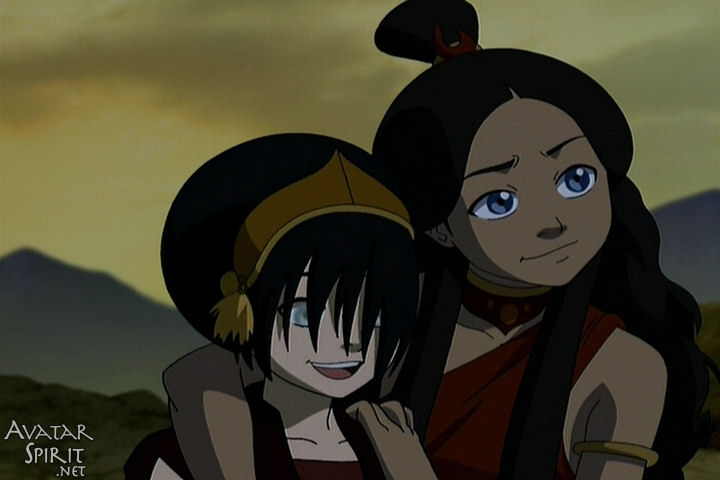
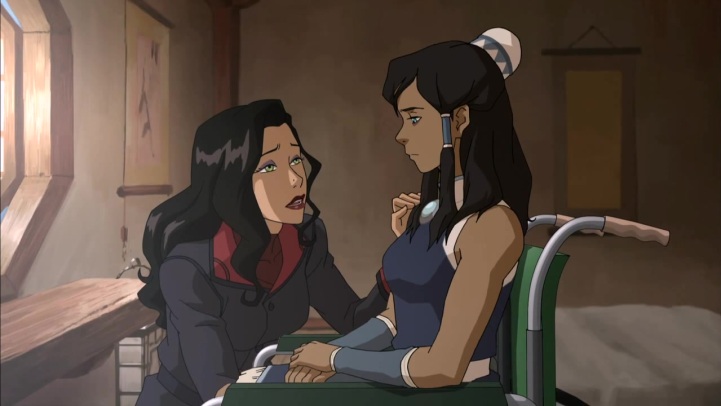
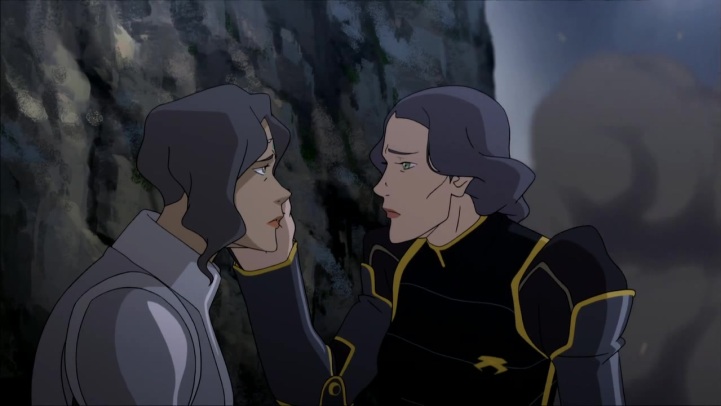
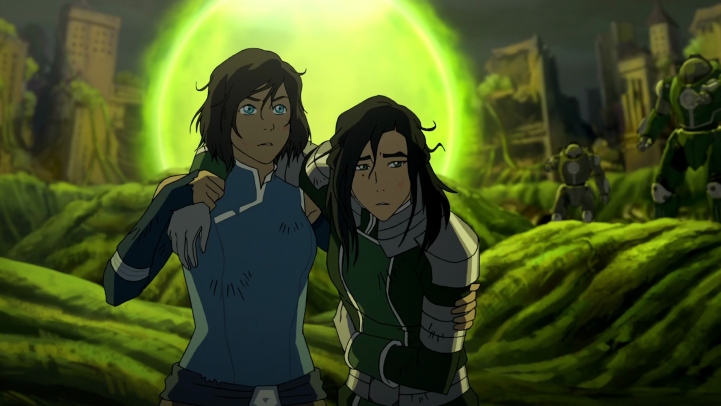
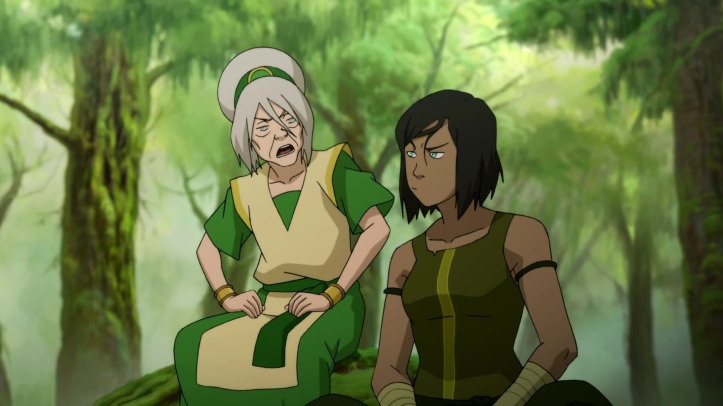
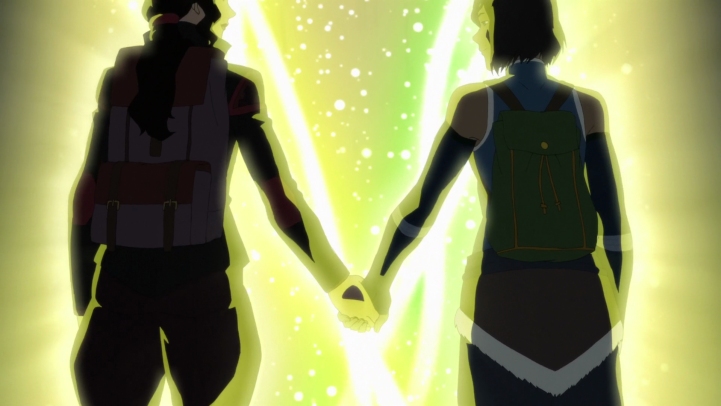
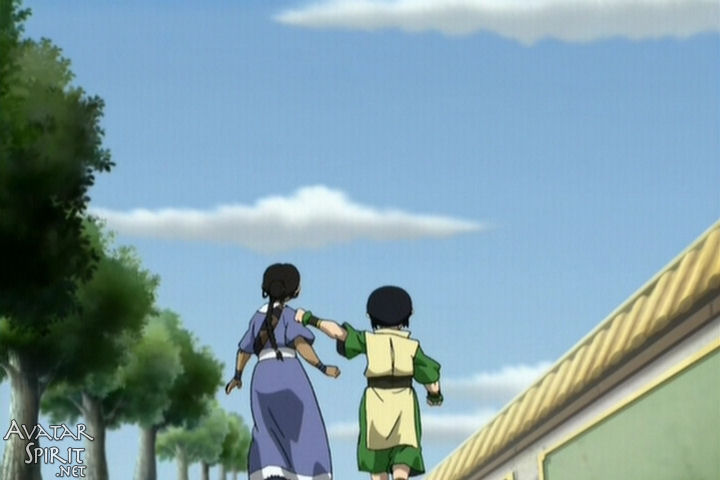
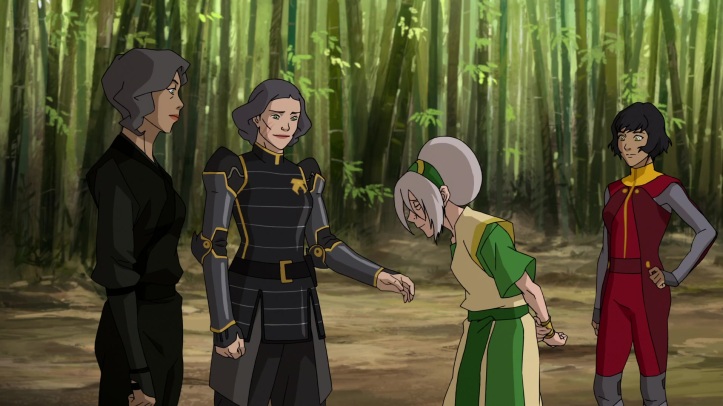
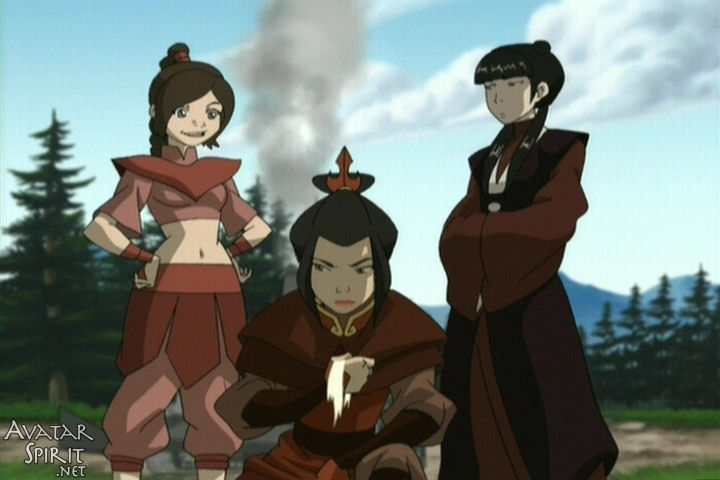
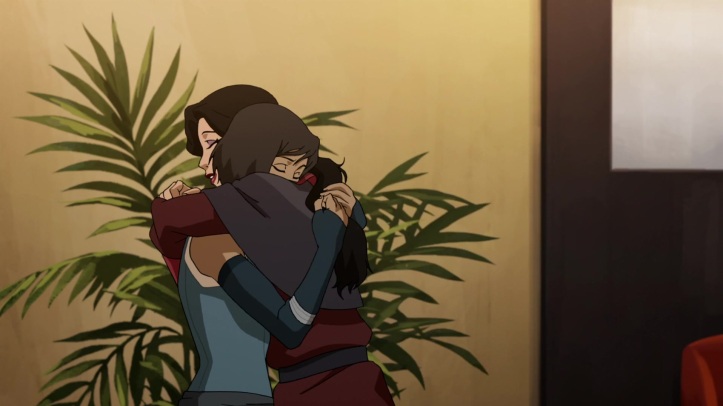
Anyway, we love it.
Avatar Land shows a lot of varied female characters which is one of the best things about the show. It shows women being nurturing as well as hard as stone, making mistakes, learning, and growing. It shows warriors, leaders, police chiefs, dictators, monarchs, villains, heroes, sisters, mothers, daughters, friends, and no one is screaming at them that they don’t belong in any one of these roles or that they should shut up because their words aren’t of value or that Avatar Land is a decaying society because we’ve allowed them to “fuck freely” or that their bodies don’t really belong to them after all as soon as some man is interested in them or if they get pregnant or that they need to smile more. Imagine some patronizing dick telling Azula, unsolicited, that she would look prettier if she smiled more.
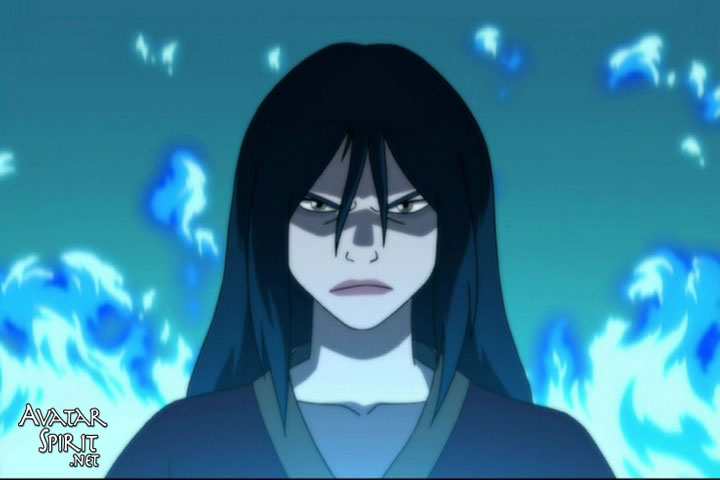
We know this meme is old, but this is the future that liberals want. And we maintain that it’s a pretty feminist move of the show’s creators to depict their world like this.
And that concludes 30 Days of Avatar! It’s been fun, guys.
Get it?
<3



